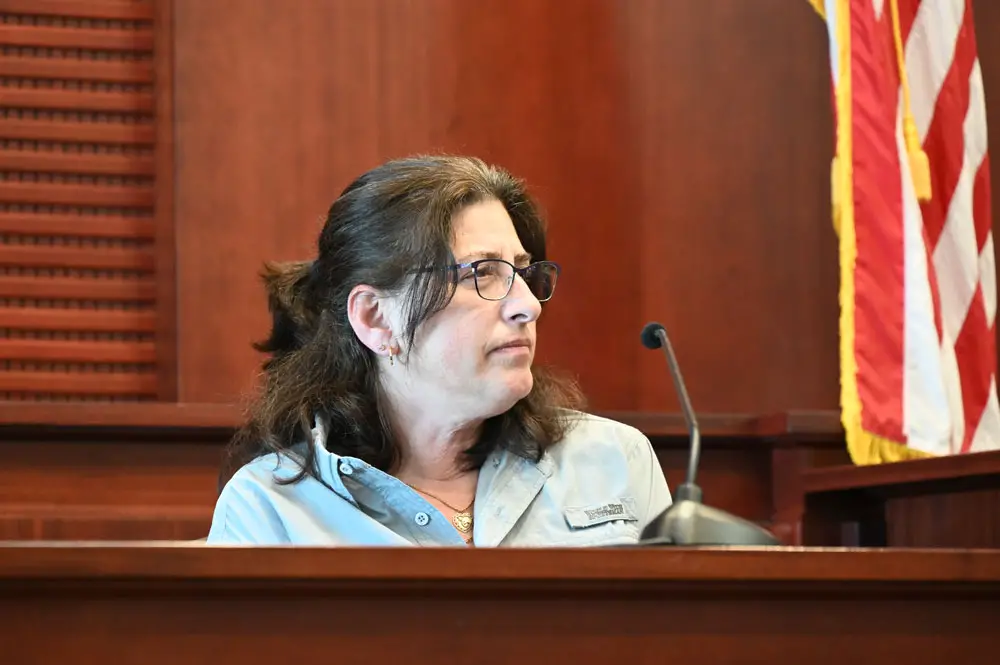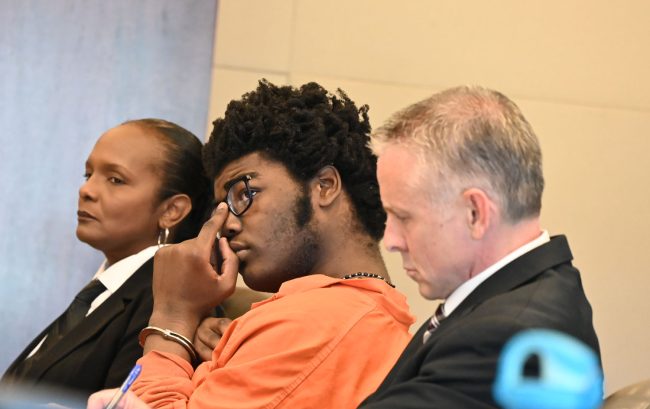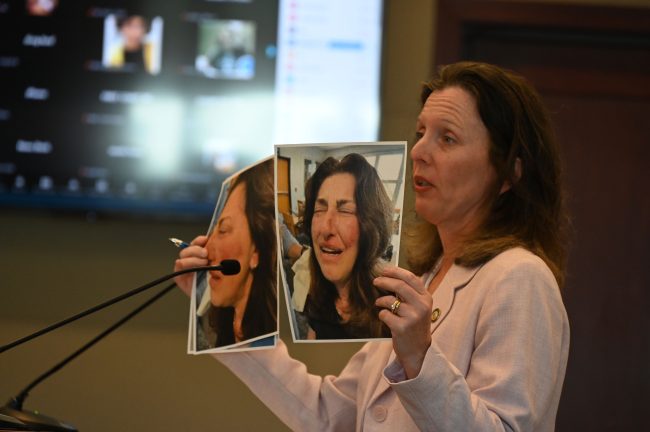
Joan Naydich, the former teacher’s aide at Matanzas High School, described how Brendan Depa destroyed her life at 10 o’clock that Tuesday morning in 2023, when the then-17-year-old special education student rushed her as she was leaving his classroom–after he spat on her–knocked her unconscious and pummeled her, all on video.
“This whole affair has, through Brendan Depa’s action on that day, has caused me to lose a job that I had for almost 19 years, lost my financial security, lost my health insurance, lost the ability to take care of myself like I used to,” Naydich said. “I lost my ability to continue school–like everything was taken away from me that morning. At 10 o’clock that morning, everything was taken away from me.”
Depa looked at her from across the room, a forefinger pressed against the bridge of his broken glasses, to keep them in place. They used to be in the same classroom every day for months when Naydich was Depa’s teacher’s aide. Today was the first time the two were in the same room again since that February day in 2023. A courtroom.
Naydich was on the witness stand. Depa was at the defendant’s table. Circuit Judge Terence Perkins was listening and taking his usual reams of notes, preparing for Depa’s sentence. Depa was charged as an adult with a first degree felony that carries a maximum penalty of 30 years in prison. He won’t get close to that, but Perkins will decide how much prison time, if any, Depa is to serve.
He did not pronounce sentence today. The case is complicated. The prosecution alone got to make its case. The defense has a case just as long. The sentencing hearing started in early afternoon and was adjourned at 5 p.m., to be resumed later this month.
But the afternoon’s testimonies filled in substantial details about what had happened that day at Matanzas, on several levels: What happened on the most immediate and physical level to Naydich; what had taken place leading up to the attack that morning and since; and what had not happened, on the school’s part–what the school had not done to better inform and prepare Naydich about Depa’s case before it got to that point. In essence, Naydich was expected to be Depa’s assigned special education aide in what amounted to a black hole of information regarding his special needs.
Naydich revealed all that after describing that morning in detail.
Naydich had been working as a paraprofessional for about a year and a half, after 17 years as what she called “a lunch lady.” She changed jobs because of something she’d always told her children: “use your mind for a job, not your body,” she said. “After 17 years of being a lunch lady, as much as I loved it, it’s just a very hard job.” She wanted to do something different. She was also working toward her associate’s degree for 15 months at the time of the attack.
She described the self-contained room where she was assigned to Depa: students with behavioral issues did everything, including lunch, in that classroom. There were between three and five students in the room, with just Naydich, a teacher and another paraprofessional as staffers. Depa daily got to leave the self-contained class to take a cybersecurity class elsewhere, with Naydich.
There was a substitute in the cybersecurity class that day, a change of routine for Depa, who is autistic. While the substitute was taking attendance he had taken out his electronic game. The substitute looked to Naydich, asking for the game to be put away. Naydich asked Depa to do so. He did. “That day was not the first day that they had an issue with it, it was just a culmination of issues with it,” Naydich said.

Depa brought the game out a second time. She again asked him to pack it up along with all his belongings as the class was about over. They were to return to the self-contained classroom. He complied. As soon as they got into the classroom, his teacher, Barbara Buchanan, asked what was going on with the game, telling him he couldn’t take it out.
“He became riled, angry, upset,” Naydich said. Naydich did not say anything to him, or take the game. But Depa felt she was taking the teacher’s side. Naydich remembers him screaming obscenities at her (at Naydich), “one name after the other.”
That’s when Naydich grabbed her stuff, threw her backpack over her shoulder and walked toward the door to leave the room. He ran after her. She turned around. He spat at her. “Well, that’s an assault,” she told him. She doesn’t remember if he retreated. Her last memory was putting her hand on the doorknob. “The rest is on video,” she said.
Assistant State Attorney Melissa Clark showed three videos of the attack, including one showing Depa running out of the classroom as he charged Naydich, and the one that was disseminated around the world, showing him brutalizing her.
She had five broken ribs, she said, three of them broken in two places. She said she also had a concussion, hearing and vision loss, vestibular problems, rotator cuff issues and a herniated disc.

She’d had breast cancer in 2017, when she was treated for radiation, and was already being treated for considerable hearing loss in both ears. That has worsened since the attack. She’s had headaches and dizziness–which persist to this day–and memory loss following the concussion, down to remembering how to use a knife or remembering where silverware was in her own house. “I had lots of issues to relearn what came naturally to me,” she said. She had to stop her college classes, having trouble concentrating and comprehending.
There’s been psychological issues: “Anger. I’m just not the same person I was,” Naydich said. She’s been diagnosed with post-traumatic stress disorder triggered by crowds: “People behind me. Anxiety kicks in, my heart rate goes up, I get headaches from it,” she said. She had daily panic attacks, and has been seeing a therapist.
Clark held up pictures of Naydich’s injuries, as if she were showing them to a jury. She was showing them to Naydich, who said she could not recall some of the pictures being taken–only those taken of her when she went to the Sheriff’s Office the day after the attack.
She went back to work. She assigned to much younger children. That didn’t last. She did not specify what specifically led to her leaving the job, but described how she continues to see doctors on a regular basis, as she has since the attack–physical therapy, neurologists, orthopedists, testing at the Mayor Clinic.
Clark asked her what she would suggest regarding the sentencing.
“I think that Brendan should pay for what he did,” she said. “There are consequences in life to bad actions, bad choices. He made the choice that day to come after me.” She said she hoped the judge would adhere to the sentencing guidelines and “not give into pressure of any sort, that could be any external pressure.”
If details of the attack had not lost a sense of shock in the intervening months, the details about the context of the attack that Kurt Teifke, Depa’s attorney, elicited from Naydich were a shock of their own, if of a different nature. Naydich’s testimony indicated to what extent teacher’s aides are kept in the dark regarding the behavioral background and requirements of students they are assigned to.
Teifke asked her about her role in the classroom, and whether she’d agree that the more she was aware of a student’s issues, the more information about the students she would need to have. “I was not informed about anything,” Naydich said.
“Whose responsibility is it to inform you?” he asked.
“I am not so sure,” she said. The teacher, Naydich thought, would have to have informed her, in so far as she was allowed to know it.
“Isn’t it very important for you to know that about a student? I mean, are you at the mercy of a teacher as far as what you should be allowed to know?” Teifke asked.
“It would appear to be so,” Naydich said. She twice referred to “the real world,” suggesting that ideals and reality did not match up that day, or in the run-up to that day: she was not made aware of Depa’s disabilities or the limitations caused by the disability.
In sum, Teifke established that Naydich would have liked to have been aware of the complex information about Depa.
“No, I did not have this information,” she said. She was aware of Depa’s Individual Education Plan, which laid out what can be simplistically called the do’s and don’ts of his education at Matanzas. She was not provided the plan. “I was under the presumption that being a para, I was not–I didn’t have readily access, like that access was not readily available to me.”
She was not aware that Depa’s behavioral issue should not be discussed in front of others, that he should not be corrected, reprimanded or redirected in the presence of his peers–all occurrences that happened before the attack.
“I was unaware of that,” she said. She was not aware of the fact that as a strategy, she was to empathize with him when he would get worked up–or even that transitioning from one class to another could be a trigger. “I was not aware of that,” she said again.
Hunger was a common trigger, too, Teifke said. “Was it in the behavior plan, did they let you know that?” he asked. She was not told. He had told her that there was no food at his group home the night before. He wanted food as soon as he arrived the morning of the attack. Naydich told him to sit and wait, as by regulations.
“We could if’s all day long. He did comply and there were no issues until 10 o’clock in the morning,” Naydich said.
He asked her if she had been made aware that discipline surrounding electronics “was a known trigger” for Depa.
“I was not informed of that,” Naydich said.
![]()










